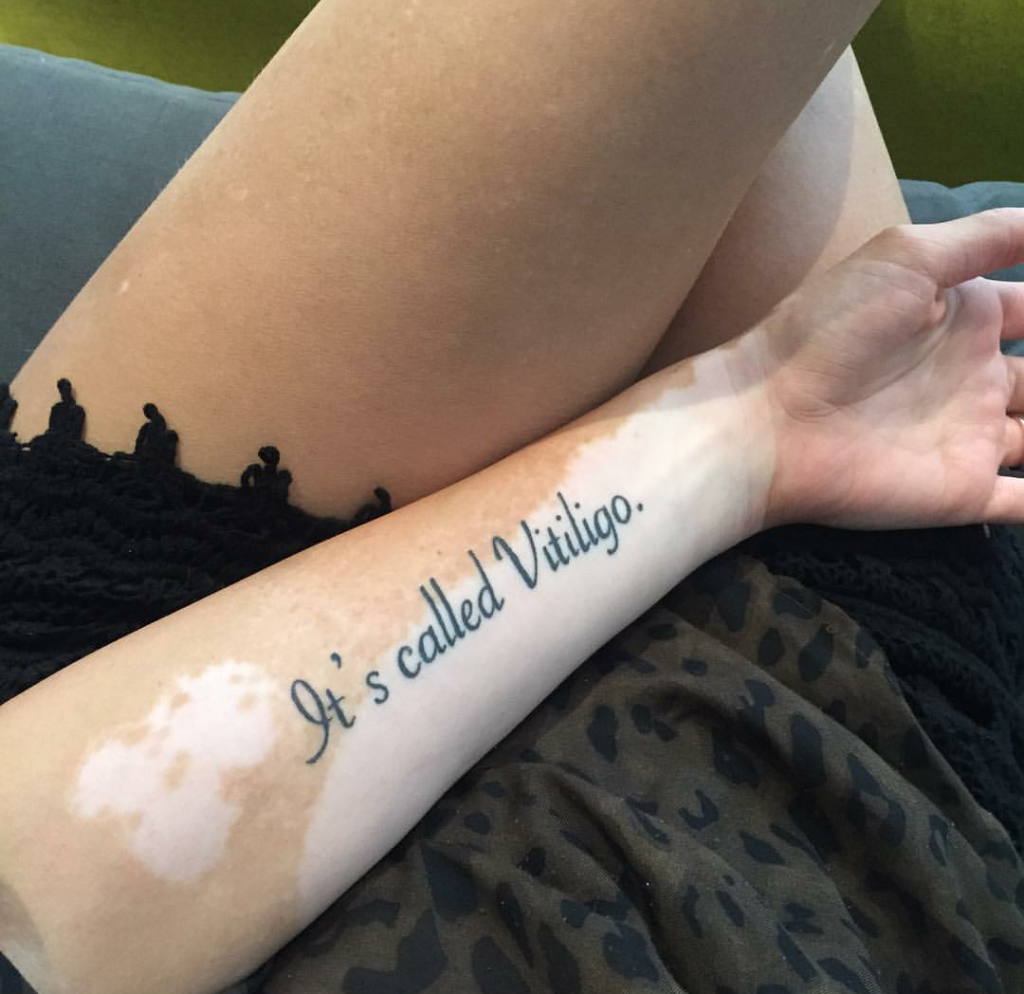In the world of tattooing, skin conditions including psoriasis, seem to be almost completely left out of the discussion. But what happens when you want to get tattooed and you have a skin condition?
Writer and tattoo collector Lucy Edwards was diagnosed with psoriasis at 16, in this interview she chats to Aimee Grace Godden, a tattooed artist also fighting psoriasis about her psoriasis journey and how it has affected her tattoos.
Psoriasis is an autoimmune condition characterised by an overgrowth of skin cells causing red lesions that range in severity from person to person. It often flares up during times of stress or when any damage is caused to the skin such as tattoos. The condition affects people so differently that there is no solid tattoo related advice for all individuals battling psoriasis. I have never had a flare due to a tattoo and my tattoos had always healed normally, but this may not be everyone’s experience.
The silence around psoriasis and tattoos unfortunately leaves many people questioning whether or not they can or should get tattoos. I spoke to Aimee to understand her experiences to open up the narrative around skin in the tattoo industry…
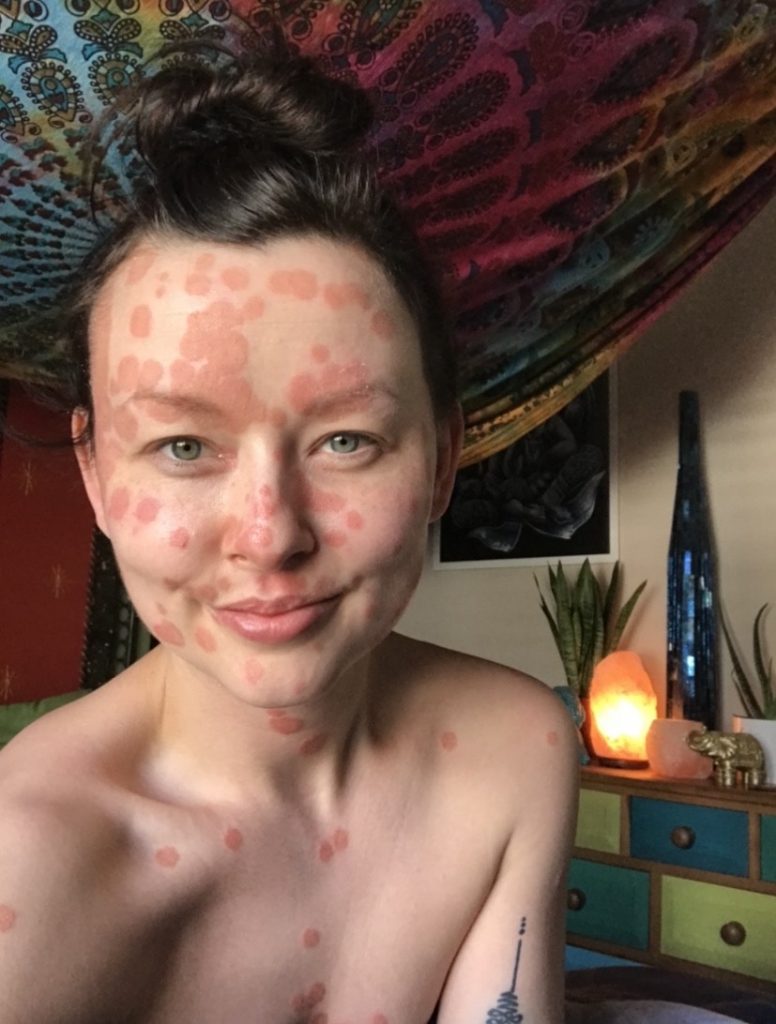
Aimee, can you tell us a little bit about your journey with psoriasis so far I was 14 when I first had signs of plaque psoriasis. This mainly affected common areas such as elbows, scalp, knees and my underarms. So although it wasn’t pleasant it was manageable. It wasn’t until two years ago in 2018 when I was 31 that I contracted a virus which triggered guttate psoriasis. A less common but rapidly spreading form of psoriasis. It covered most of my face and body.
This was much harder to deal with not just because of the discomfort, pain and itching. But because my appearance completely changed, I felt ugly at first, like no one would look at me the same. I couldn’t face a mirror or leaving the house except for work. I thought I’d never meet anyone to date and I’d be different forever.
Eventually I accepted and embraced my new look and I actually learned to love myself all over again. I don’t have such high expectations of myself anymore, my vanity has disappeared and I no longer worry what people think about the way I look. I love myself just as I am with or without a flare up.
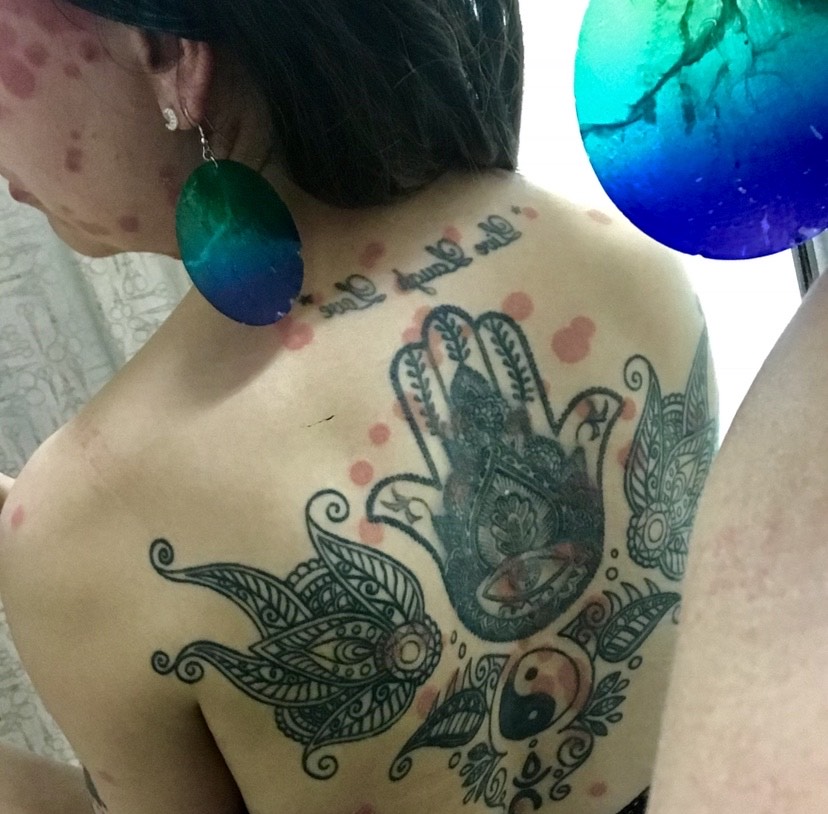
Talk us through your tattoo collection, do you have a favourite tattoo? I have six tattoos. Including two large pieces, my first was my right thigh which I sometimes regret a little, it doesn’t have a lot of meaning to it, it’s a mixture of random things, a candy skull, roses, a key, a potion bottle. My back piece is made up of symbols I love the meaning behind the Hamsa, Om, Ying and Yang. My smaller pieces are all on my arms. I have of the sun and moon on my right forearm, this is a memorial tattoo for a best friend that passed a few years ago. She is the sunshine.
I have an unalome and lotus flower tattoo on my left forearm meaning wisdom and the path to perfection, and the lotus represents overcoming adversities. I had this tattooed after struggles with my mental health. I also have a quote on my lower left arm saying “The Universe gives its toughest battles to its bravest Warriors” I know this isn’t the traditional quote but I changed it slightly after having my severe psoriasis outbreak in 2018.
People who have psoriasis or another auto immune disease call ourselves warriors and I wanted a tattoo to remind myself and others how brave we are and that we have got this!
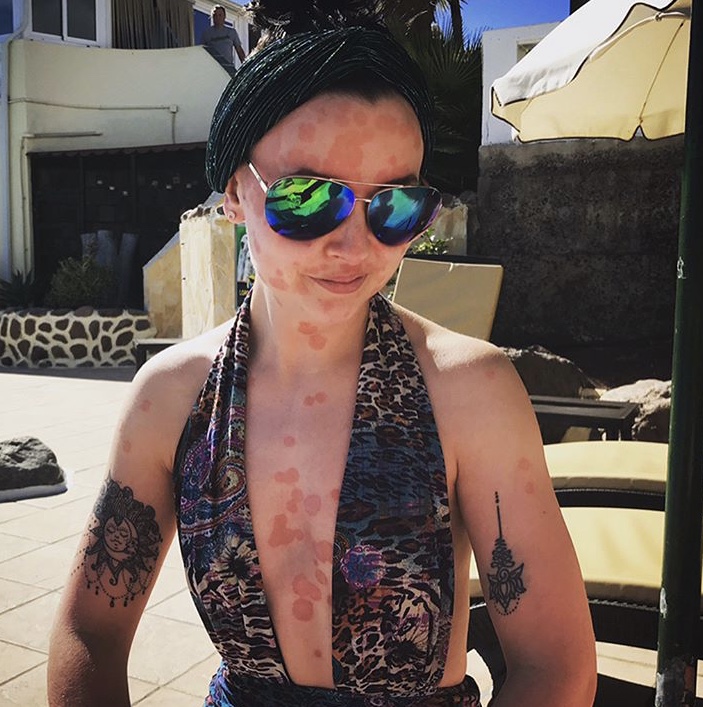
Are you actively planning on getting any new tattoos? (post pregnancy of course!) Yes definitely, I’m already planning a tattoo of an image which represents my baby’s name. I can’t give too much away as we haven’t announced the name yet.
Do you have a specific aftercare routine for your tattoos that takes your psoriasis into consideration? I keep it simple. I don’t use any product a tattoo artist recommends not because they don’t work, but because I have to consider the fact my skin can be triggered by anything. So I stick with coconut oil. It helps my tattoo heal fast and I’ve never had any problems.
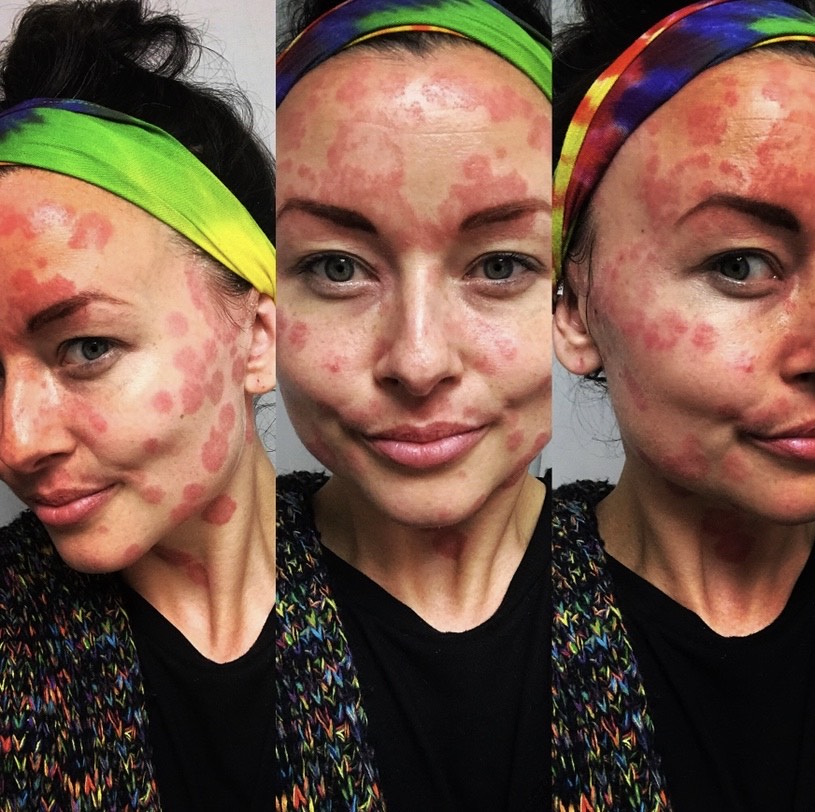
How does your psoriasis affect your tattoos? There is something called the Koebner Phenomenon, which can happen to many psoriasis warriors. Which is when damaged or broken skin develops new psoriasis around and on that area. For people that suffer with this it’s pretty impossible to have a tattoo done without this happening. So I highly recommend seeking your doctor’s advice. I’m actually one of the lucky ones.
My mum suffers from Koebner phenomenon but I haven’t so far. This means I am able to have tattoos while I’m not in a flare up without any concern it will develop into psoriasis later on. It’s also important to mention my tattooist will not tattoo me during a flare. I’d probably have more tattoos if it wasn’t for flare ups.
When I do have a flare up I worry the psoriasis will damage the tattoos I already have. I have noticed some of the ink fades faster during a flare but fortunately I’ve had no major damage.
Do you have any advice for those with psoriasis who also want a tattoo? Please speak with your doctor first and of course with your tattooist. Your tattooist is right to say no if you have any signs around that area of psoriasis so please listen to them. Not many people have heard of the Koebner phenomenon but it’s worth researching.
I think most psoriasis warriors will know how their skin and psoriasis reacts by now to damaged or broken skin. If you ever cut yourself or even a small graze, ask yourself does it turn into psoriasis? If so I wouldn’t recommend a tattoo. It’s not worth it, and the tattoo will never heal well. If you know you do not suffer from Koebner then I’d say it’s safe to have tattoos on unaffected skin not during a flare.

We love that you are so involved with body positivity, how has your psoriasis affected your confidence? Initially the 2018 flare completely knocked my confidence. I couldn’t leave the house except for work, I hated what I saw in the mirror and I realised I took my looks for granted before. I never thought I was beautiful, but I didn’t appreciate that I looked “normal” as some might say or that I had no noticeable flaws.
But, it didn’t take long for me to find self-acceptance. In fact, it only took a few weeks. It was after posting a photo of myself on my social media to explain to my family what was going on and why I was in hiding. I didn’t expect my photo to get so much attention from strangers and the media.
Although I had to deal with trolls the positivity and kindness towards me totally outweighed the negativity. The more I posted the more people sent me messages of love and support. People started telling me I was an inspiration, I never thought I’d be called that. It soon boosted my confidence. I felt beautiful in my skin for the first time even with a huge flare up.
I’ve learned it’s what’s inside that counts and it’s about self-acceptance and embracing your flaws how you treat yourself and what you put out to the world is what you will receive in return.
Words: Lucy Edwards, a 20-year-old tattooed university student, cat mum and trying-new-things enthusiast. You’ll most likely find Lucy posting about mental health awareness and self-acceptance on her Instagram.
